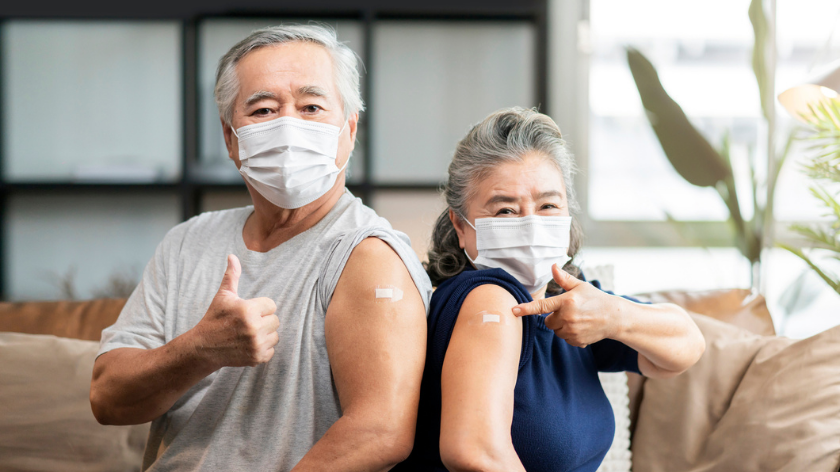The coronavirus and its variants continue to show their faces. Although it may feel impossible to keep up with all the newly emerging information on the virus, variants, and resulting recommendations, these two facts are certain – you can continue to lower your risk for severe illness, and the pandemic will end. In the meantime – please, take care of your mental health.
Let’s start with a reminder of how you can protect yourself and others from severe illness. Take and track these actions:
- Get vaccinated and boosted
The data is clear – people who are vaccinated and boosted experience less severe disease. It’s recommended that all people ages 5 and above get vaccinated and ages 12 and over get boosted.
Find a COVID-19 vaccine or booster near you: visit vaccines.gov, text your ZIP code to 438829, or call 1-800-232-0233.
- Wear a mask
We’ve come a long way in understanding what works when it comes to face coverings. A proper fitting mask worn when in public indoor spaces is advised, regardless of vaccination status. With the highly contagious Omicron variant circulating, it’s more important than ever to wear a mask.
Also, consider upgrading from a cloth mask. Look for good filtration (for example, a blue surgical mask) and a good fit (covers the nose and mouth, without gaps). In fact, experts are suggesting double masking with a surgical mask underneath a cloth mask or wearing a higher grade mask like a KN95 when in higher-risk public spaces.
- Stay home if you have symptoms
COVID-19 symptoms are similar to allergies, a cold, or flu and may include fever, chills, cough, shortness of breath, fatigue, body aches, and headache. You may think your symptoms are just from a cold but even if you have a hint of illness, stay home, get tested and self-isolate from those in your household. You are most contagious when you have symptoms – stay home if you feel unwell. Consult with your doctor if have symptoms that concern you.
Follow your doctor’s orders and/or local health department guidelines on when you can return to a normal routine. If you have lingering symptoms and you must go out, be courteous and wear a high-quality mask at all times, clean your hands frequently and keep your distance from others.
- Get tested
Testing is yet another strategy to help stop the spread of the virus. Consider buying enough home tests for each person in your family in case you have symptoms and want to know your status. You may purchase home tests online and many pharmacies have these tests – but do call ahead as they are currently in high demand. Stay abreast of local testing sites – with the current high numbers of infections, there are many testing sites popping up throughout the country. Additionally, some schools and the federal government will have home tests available so be on the lookout for those opportunities in the coming weeks.
- Take care of your mental health
Last but certainly not least, take care of yourself. These last two years have been challenging which makes it especially important for each of us to be aware of our mental state, stay resilient and reach out for support. Check-in with yourself regularly and practice those habits that have worked in the past for you – maybe it’s meditation, meeting with a therapist, exercise, journaling, connecting with a friend, or spending time in nature. You’ll find a bevy of resources available to you listed in our World Mental Health Day blog post – take a moment to center yourself and find resources that work for you.
Tonja Dodd, MPH, is a Senior Health Strategy Analyst at Vitality Group where she translates clinical guidelines into risk-appropriate health promotion strategies to engage members in healthy behaviors. Her background is in public health with 25 years of experience designing, developing, and delivering health and wellness programs and products. Tonja finds her healthy place is being active outdoors and spending time with family, friends, and pets.








